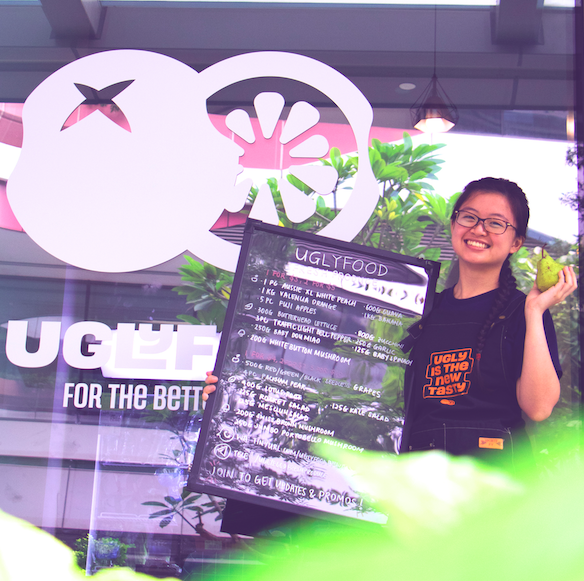Where does food waste go once it’s thrown out? For many in Singapore, that journey starts and ends with the rubbish chute. What you might not know is that most food disposed here gets incinerated — even fruits and vegetables discarded by suppliers due to cosmetic blemishes.
It’s something Yeo Pei Shan finds “very wasteful, and quite sad”. It’s why the 25-year-old co-founded social initiative Ugly Food in 2016. They collect “ugly” produce that food suppliers find hard to sell but that’s perfectly edible, and offer them to environmentally- conscious customers. Don’t like seeing the scars on your pears? Ugly Food also produces juices, soy milkshakes and vegan popsicles with the produce it rescues. In 2019 alone, Ugly Food saved 91 tonnes of fruits, vegetables “and a small amount of mushrooms” from the incinerator.
Says Yeo: “In Singapore, we don’t see where our produce comes from, so when we see these perfect fruits and veggies in the supermarkets, we think that’s normal.” This, she points out, has led to many misconceptions among Singaporeans, namely that any fruit that falls short of that ideal is “not normal”.
Yeo began Ugly Food as a student at the Singapore University of Technology and Design (SUTD). She and her co-founders were part of a programme by the SUTD-MIT International Design Centre, which was formed in partnership with the JP Morgan Foundation to encourage students to form their own social initiatives. After graduating in 2018, Yeo decided to turn her school project into a full-time job.
Initially, Ugly Food approached vendors in wet markets to collect fruits and vegetables they couldn’t sell. As the initiative gained momentum, they started partnering larger companies like RedMart and Ban Choon Marketing.
In October, she participated in Global Compact Network Singapore as a Youth Track speaker. By sharing how she applied sustainability to Ugly Food’s operations, she hopes to call on other businesses to do the same. For one, Ugly Food encourages customers to donate unwanted reusable totes to its SUTD store; this can help eliminate plastic bags from the equation.
Ugly Food even welcomes customers to donate plastic boxes that are in good condition to the store; the team can then repack loose and delicate fruits — like berries, which are particularly susceptible to bruising — into these containers.
“We don’t say we’re plastic-free because we find value in it. We embrace the idea of plastic in that we reuse it,” she says. “Sustainability is all about how we use our resources right now.”
This story first appeared in the November 2020 issue of A Magazine.
